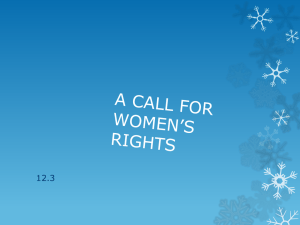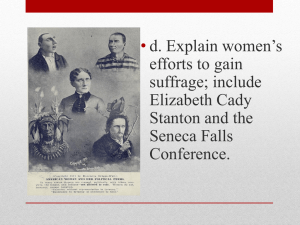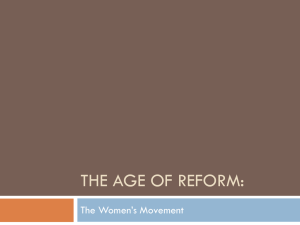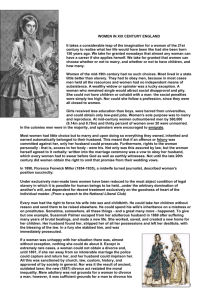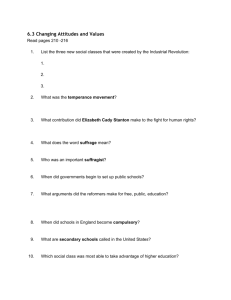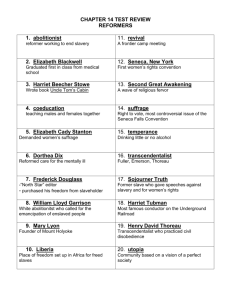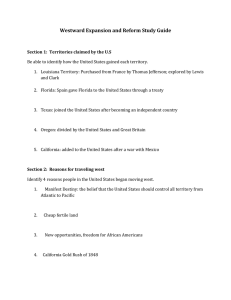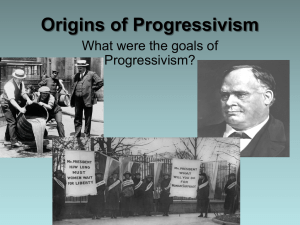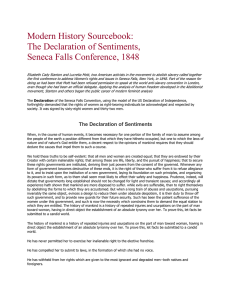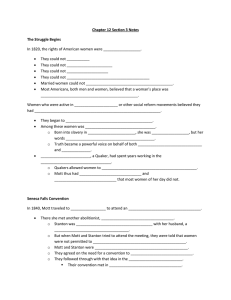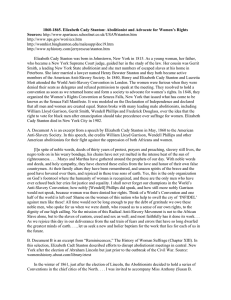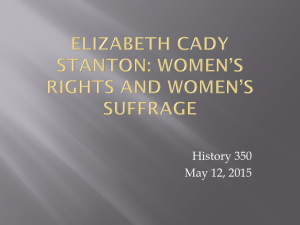Age of Reform (Women's Rights)
advertisement
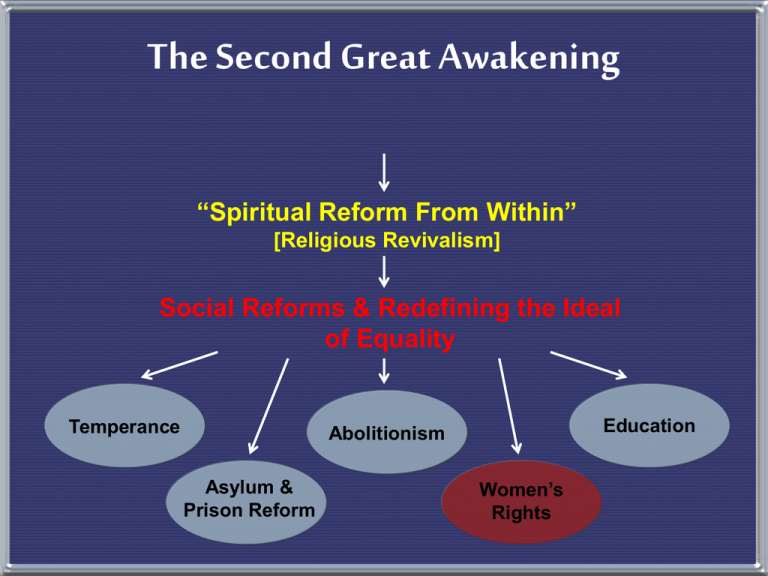
The Second Great Awakening “Spiritual Reform From Within” [Religious Revivalism] Social Reforms & Redefining the Ideal of Equality Temperance Education Abolitionism Asylum & Prison Reform Women’s Rights th Early 19 Century Women 1. Unable to vote 2. Legal status of a minor 3. Single could own her own property 4. Married no control over her property or her children 5. Could not initiate divorce 6. Couldn’t make wills, sign a contract, or bring suit in court without her husband’s permission “Separate Spheres” Concept Republican Motherhood evolved into the “Cult of Domesticity” A woman’s “sphere” was in the home (it was a refuge from the cruel world outside). Her role was to “civilize” her husband and family. An 1830s MA minister: The power of woman is her dependence. A woman who gives up that dependence on man to become a reformer yields the power God has given her for her protection, and her character becomes unnatural! Cult of Domesticity = Slavery The 2nd Great Awakening inspired women to improve society. Angelina Grimké Sarah Grimké Southern Abolitionists Lucy Stone American Women’s Suffrage Association edited Woman’s Journal Women’s Rights Movement When abolitionists divided over the issue of female participation, women found it easy to identify with the situation of the slaves 1848: Feminist reform led to Seneca Falls Convention Significance: launched modern women’s rights movement Established the arguments and the program for the women’s rights movement for the remainder of the century What It Would Be Like If Ladies Had Their Own Way! Women’s Rights 1840 split in the abolitionist movement over women’s role in it. London World Anti-Slavery Convention Lucretia Mott Elizabeth Cady Stanton 1848 Seneca Falls Declaration of Sentiments The first Woman’s rights movement was in Seneca Falls, New York in 1849…… •Educational and professional opportunities •Property rights •Legal equality •repeal of laws awarding the father custody of the children in divorce. •Suffrage rights •The following is an excerpt from the Seneca Falls Declaration written by Elizabeth Cady Stanton. •Notice that the language and wording is similar to the Declaration of Independence. We hold these truths to be selfevident that all men and women are created equal; that they are endowed by their Creator with certain inalienable rights; that among these are life, liberty and the pursuit of happiness; that to secure these rights governments are instituted, deriving their just powers from the consent of the governed…… The history of mankind is a history of repeated injuries and usurpations on the part of man toward woman, having in direct object the establishment of an absolute tyranny over her. To prove this, let facts be submitted to a candid world…. •He has made her, if married, in the eye of the law, civilly dead. •He has taken from all right in property, even to the wages she earns. He has made her, morally, an irresponsible being, as she can commit many crimes with impunity, provided they be done in the presence of her husband. In the covenant of marriage, she is compelled to promise obedience to her husband, he becoming, to all intents and purposes, her master; the law giving him power to deprive her of her liberty, and to administer chastisement. Susan B. Anthony -Joined the women’s rights movement after the Seneca Falls Convention. -She and Stanton formed the National Woman Suffrage Party. -Anthony was unmarried, so she traveled around the country to gather support for women’s rights. Susan B. Anthony on Marriage and Slavery “The married women and their legal status. What is servitude? “The condition of a slave.” What is a slave? “A person who is robbed of the proceeds of his labor; a person who is subject to the will of another…” I submit the deprivation by law of ownership of one’s own person, wages, property, children, the denial of right as an individual, to sue and be sued, to vote, and to testify in the courts, is a condition of servitude most bitter and absolute, though under the sacred name of marriage. Some Victories - Some states, like New York, changed their property laws and started to treat women equally. -There was no National Equality at this point. - Education started to open up for women as well (Remember Mt. Holyoke). -First women to graduate from an American Medical School was Elizabeth Blackwell in 1849; Geneva Medical College in New York. - Full suffrage was not obtained until the 19th Amendment, which was passed in 1920
